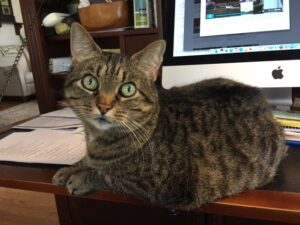This conversation with myself arises from a training session yesterday for Docents at the Nelson-Atkins Museum of Art. Our presenter, PaKou Her, endeavored to give us a framework for addressing sensitive subjects and emotions that arise during our conversations with visitors in the presence of certain works of art, with the primary focus on racism.
Several times on this blog, I have cited the Biblical message delivered by angels, prophets, and Jesus: Don’t be afraid. Fear not. What is there to be afraid of? According to some accounts, three-hundred-and-sixty-five times! One for each day of the year. About racism, war, domestic abuse, and every form of human violence—anger, hate, revenge, warfare–I might say that all, all spring from fear. Fear, it appears to me, is a primal, protective response to the unknown. The tiger in the dark. It’s a safety element built into our deep selves. Well, I don’t encounter many tigers in my part of the world. However, there is still darkness.
Sometimes that darkness looks to me like ignorance. Or perhaps it is a belief or conviction different from mine that I can’t even begin to understand. Sometimes it is a whole arena of life experience that I do not and cannot know. The only way to address the darkness is by trying to reduce what is unknown, in so far as possible, and bring in some light.
First of all, I must acknowledge and take steps to alleviate my own fears, and that begins with naming or identifying them specifically. Here’s one now: I fear attending night-time events in predominantly Black neighborhoods not far from my own because I have read about random gun violence there. Although I have felt “uncomfortable” as one of few white people at such a gathering, that feeling is not fearful, because I do trust in the goodwill of most people of color (they’ve had a lot of practice when it comes to white people). And they might have reason to fear what I do in the parking lot. I suppose in that we have common cause. Does this fear convict me of racism? What do you think?
Here’s my work: stepping out. I need to work harder at getting to know my actual neighbors, not just the hypothetical neighbor cast into my path as in the story of the Good Samaritan. I need to shine some light on my fear and hear about the fears of others in everyday life.
One final piece: I’ve been reading a book by a sage and scholar named Thich Naht Hanh, who was nominated by Dr. Martin Luther King Jr. for the Nobel Peace Prize. In my journal, I have written: In my understanding of life, an experience and a relationship with a transcendent unifying energy—call it “Mind”—defines our humanity. Faith, religion, and spiritual practices, however diverse, are evolving efforts to bring all humanity together. Some call that energy “compassion.” Some call it “love.” Some call it “Brahman” or “God.”
The essence: Reaching out to my neighbor. Listening. That’s not theological or theoretical.









